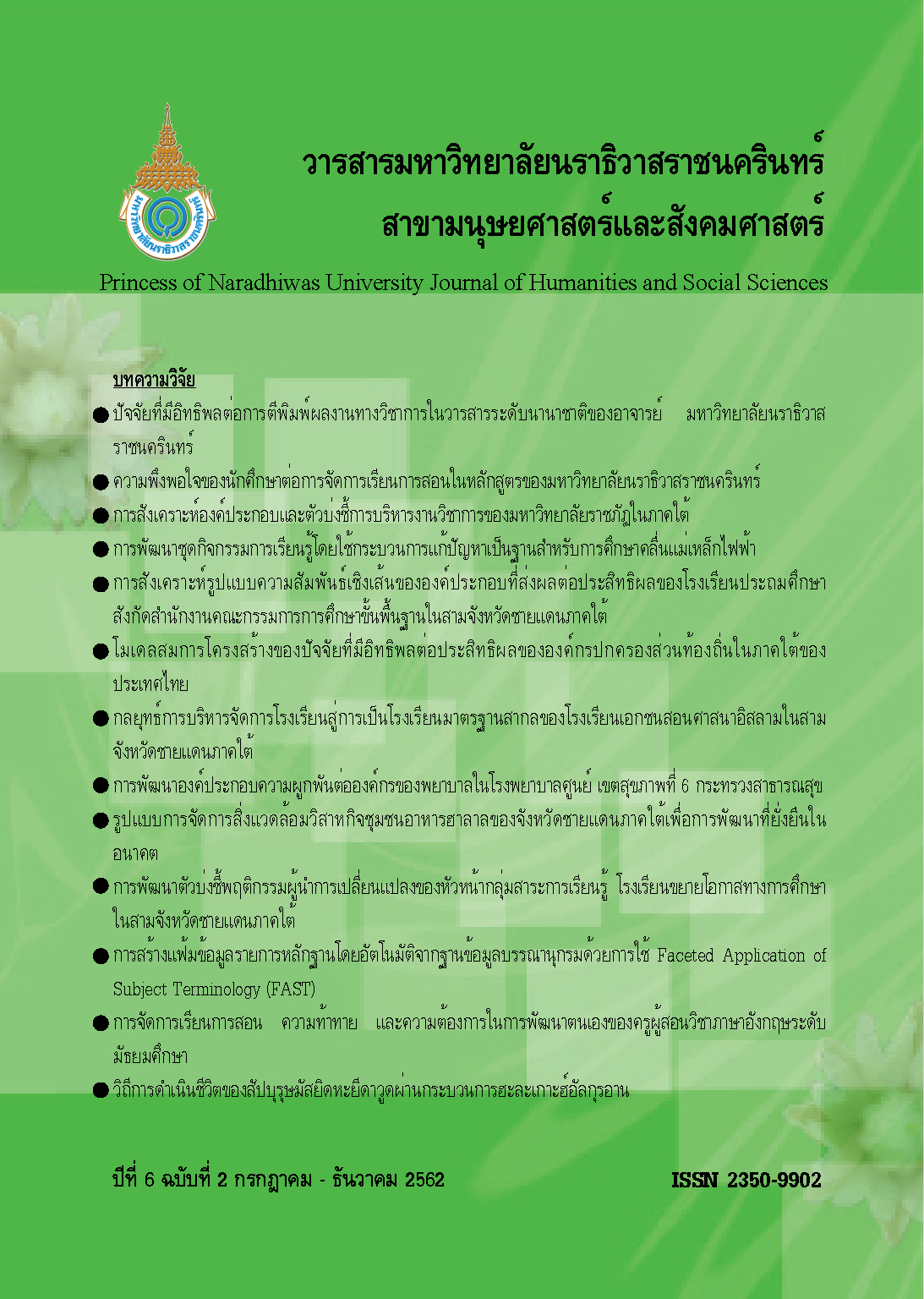The Development of Change Agent Behavior Indicators of Learning Program Heads of Expansion Education Schools in the Three Southern Border Province
Main Article Content
Abstract
ABSTRACT
The aims of this research were to investigate behaviors, elements, and behavioral indicators of transformational leadership and to weigh the importance of behavioral indicators of transformational leadership of department heads in Opportunity Expansion Schools in three southernmost provinces. The research was divided into two phases. In the first phase, pertinent documents and in-depth interviews were analyzed and synthesized in order to study behaviors of transformational leaders, which was evaluated by nine experts. Subsequently, questionnaires were used to investigate behavioral elements and indicators of transformational leadership of department heads in opportunity expansion schools in three southernmost provinces. The validity (CVI) and reliability of questionnaires were equal to .91 and .988 respectively. The data were collected through 432 respondents and subsequently analyzed using exploratory factors by means of Varimax. In the second phase, weighing the importance of each behavioral indicator of transformational leaders was measured by means of questionnaires given to 30 department heads in opportunity expansion schools in three southernmost provinces. The minimum position categories of the department heads were at the senior professional level. By comparing indicators.
The study found: indicated six elements and 48 indicators of transformational leadership behaviors of the department heads in opportunity expansion schools in three southernmost provinces which are enumerated below: Element 1: Leadership behaviors pertaining to identity and 17 indicators. Element 2: Leadership behaviors pertaining to self-development and 12 indicators. Element 3: Leadership behaviors pertaining to teaching and learning management techniques and 7 indicators. Element 4: Leadership behaviors pertaining to techniques and 5 indicators. Element 5: Leadership behaviors pertaining to teaching and learning management techniques and 4 indicators. Element 6: Leadership behaviors pertaining to education and 3 indicators. The study of weighing the important found the results demonstrated the average, ranging from 3.77-4.37. On average, all indicators pointed to the high level.
Keywords : Change Agent Behavior Indicators / Learning Program Heads / Three Southern Border Provinces
Article Details
References
กระทรวงศึกษาธิการ. (2545). พระราชบัญญัติการศึกษาแห่งชาติ พ.ศ. 2542 และแก้ไขเพิ่มเติม (ฉบับที่ 2 ) พ.ศ.2545. กรุงเทพมหานคร : โรงพิมพ์คุรุสภาลาดพร้าว.
_________. (2551). หลักสูตรการศึกษาขั้นพื้นฐาน. กรุงเทพมหานคร : โรงพิมพ์คุรุสภาลาดพร้าว.
กัลยา วานิชย์บัญชา. (2554). การวิเคราะห์สถิติขั้นสูงด้วย SPSS for Window. (พิมพ์ครั้งที่ 9). กรุงเทพมหานคร: ธรรมสาร.
จารุวรรณ เยื่อสูงเนิน. (2556). การพัฒนาตัวบ่งชี้คุณลักษณะของหัวหน้ากลุ่มสาระการเรียนรู้ที่เอื้อต่อการทำงานเป็นทีม ในโรงเรียนสังกัดบริหารส่วนจังหวัด ในภาคตะวันออกเฉียงเหนือตอนล่าง. วิทยานิพนธ์ ศึกษาศาสตรดุษฎีบัณฑิต (การบริหารการศึกษา). คณะศึกษาศาสตร์ มหาวิทยาลัยวงษ์ชวลิตกุล, นครราชสีมา.
ชูศรี วงศ์รัตนะ. (2553). เทคนิคการใช้สถิติเพื่อการวิจัย. (พิมพ์ครั้งที่ 12). นนทบุรี: ไทเนรมิตกิจ อินเตอร์โปรเกรสซิฟ.
ธีรเดช สายเส็น. (2555). องค์ประกอบแลตัวบ่งชี้คุณลักษณะเด่นชัดเฉพาะของโรงเรียนประถมศึกษาเอกชนยอดนิยมภาคใต้ฝั่งอันดามัน. วิทยานิพนธ์ ศึกษาศาสตรดุษฎีบัณฑิต
(การบริหารการศึกษา). คณะศึกษาศาสตร์ มหาวิทยาลัยชวลิตกุล, นครราชสีมา.
บรรเจิด อุ่นมณีรัตน์. (2555). รูปแบบการบริหารจัดการศึกษาเพื่อเพิ่มพลังอำนาจการทำงานของครู
ในสถานศึกษาระดับประถมศึกษา สังกัดสำนักงานคณะกรรมการการศึกษาขั้นพื้นฐาน. วารสารวิชาการมหาวิทยาลัยอีสเทิร์นเอเชีย ฉบับมนุษยศาสตร์และสังคมศาสตร์, 2(1), 78-88.
พระราชบัญญัติการศึกษาแห่งชาติ (ฉบับที่ 3). (2553). ราชกิจจานุเบกษา. เล่ม 127 ตอนที่ 45 ก. หน้า 1-3.
เพชรน้อย สิงห์ช่างชัย. (2549). หลักการและการใช้สถิติการวิเคราะห์ตัวแปรหลายตัวสำหรับการ
วิจัยทางการพยาบาล. พิมพ์ครั้งที่ 3. สงขลา: ชานเมือง.
มนัสชัย พรมสวัสดิ์. (2555). พฤติกรรมผู้นำของหัวหน้ากลุ่มสาระการเรียนรู้ตามทรรศนะของครูในกลุ่มสาระโรงเรียนวิเศษไชยชาญ “ตันติวิทยาภูมิ” สังกัดสำนักงานเขตพื้นที่การศึกษามัธยมศึกษา เขต 5. สารนิพนธ์ศึกษาศาสตรมหาบัณฑิต สาขาการจัดการศึกษา วิทยาลัยครุศาสตร์มหาวิทยาลัยธุรกิจบัณฑิต, กรุงเทพมหานคร.
รัฐธรรมนูญแห่งราชอาณาจักรไทย. (2550). ราชกิจจานุเบกษา. เล่ม 124 ตอนที่ 47 ก. หน้า 8.
วลัยลักษณ์ วุฒิปราณี. (2555). ความคิดเห็นของครูเกี่ยวกับพฤติกรรมผู้นำของหัวหน้ากลุ่มสาระการเรียนรู้โรงเรียนเตรียมอุดมศึกษาพัฒนาการลำลูกกา. สารนิพนธ์ศึกษาศาสตรมหาบัณฑิต สาขาการจัดการศึกษา วิทยาลัยครุศาสตร์มหาวิทยาลัยธุรกิจบัณฑิต, กรุงเทพมหานคร.
สนิท ซื่อสัตย์. (2543). สภาพการบริหารงานวิชาการโรงเรียนขายายโอกาสทางการศึกษาตามทัศนะของผู้บริหารโรงเรียนและครู สังกัดสำนักงานการประถมศึกษาจังหวัดอุบลราชธานี. วิทยานิพนธ์ ครุศาสตรมหาบัณฑิต (การบริหารการศึกษา.). สถาบันราชภัฏอุบลราชธานี,อุบลราชธานี.
สมร ปาโท. (2555). รูปแบบการพัฒนาภาวะผู้นำของผู้บริหารสถานศึกษาสู่ความเป็นมืออาชีพ สังกัด
สำนักงานคณะกรรมการการศึกษาขั้นพื้นฐาน. วารสารวิชาการมหาวิทยาลัย
อีสเทิร์นเอเชีย ฉบับสังคมศาสตร์และมนุษยศาสตร์, 2(1), 99-109.
สุชาต ประสิทธิ์รัฐสินธุ์. (2548). เทคนิคการวิเคราะห์ตัวแปรหลายตัวสำหรับการวิจัยทางสังคมศาสตร์และพฤติกรรมศาสตร์. กรุงเทพฯ: สถาบันบัณฑิตพัฒนบริหารศาสตร์.
Hair, F Joseph., et al. (2010). Multivariate Data Analysis. (7th ed). New Jersey: Pearson Education.


